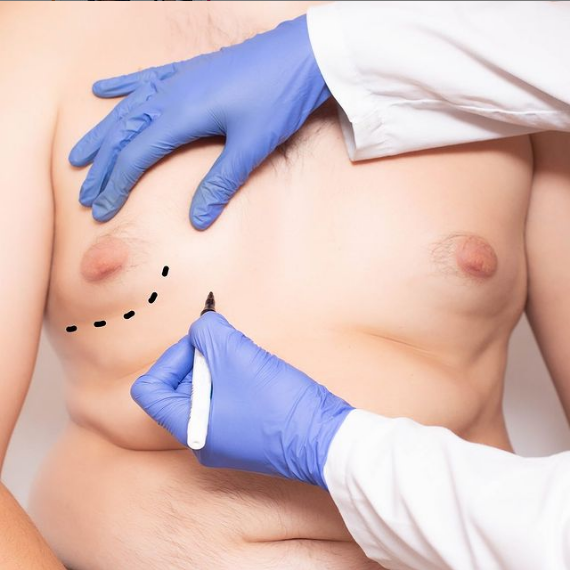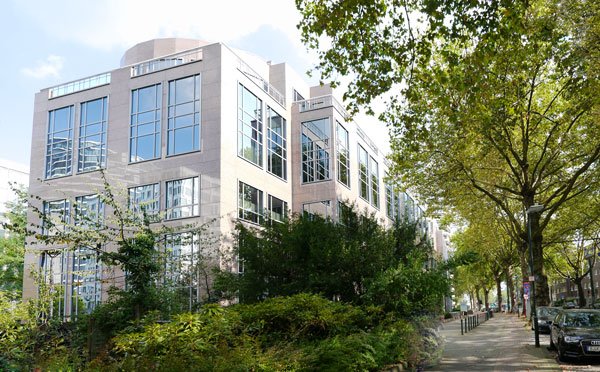Gynecomastia is the usually benign enlargement of the male breast. It can occur on one or both sides.
However, if this breast enlargement occurs on one side in older men in particular, it may also be breast cancer. Therefore, even if there is little doubt, an ultrasound examination and possibly a mammogram should be carried out.
- The cause of gynecomastia cannot be traced in 50% of cases.
- 90% of all newborns have a physiological shape.
- During puberty, its frequency is around 40-70% and is also not a disease.
- Around 50% of men develop a man bosom in the course of their lives.
Our team at Düsseldorf Plastic Surgery will be happy to discuss the treatment options with you in person.

Contents
Yuveo Clinic
Treatment options for enlarged male breasts
Breast reductions are just as possible for men as for women. However, the extent of the procedures is usually much smaller.
Causes
Conservative treatment
Surgery for gynecomastia
Pseudogynecomastia
Surgical treatment of gynecomastia
The type of gynecomastia surgery depends on the size and texture of the breast:
Surgery for pseudogynecomastia
In the case of fatty male breasts (pseudogynecomastia), which is not accompanied by an increase in glandular tissue, liposuction is sufficient for minor and moderate degrees of the condition. We can often dispense with the skin incision in the areola area.
During liposuction for gynecomastia, we make a small incision on the lateral edge of the pectoral muscle and infiltrate a fluid that causes the area to be suctioned to swell. The fat cells swell, making them easier to suction out. We then suction out the fatty tissue. It is important to leave the transitions at the edges unobtrusive so that no steps are created.
Sometimes the male breast is extremely pronounced and is then equivalent in appearance to a large female breast. Liposuction is not sufficient to correct this. In such cases, a breast reduction must be performed using the usual incision techniques.
Surgery for a glandular male breast
Liposuction is often not sufficient for a glandular male breast, as the mammary gland is a very firm tissue that can hardly be suctioned out.
We therefore usually combine liposuction with the removal of the mammary gland in men (= andromastectomy). The liposuction is used for contouring.
During an andromastectomy, we make an incision in the areola through which the excess gland is removed. We often insert drains at the end of the operation.
It is not uncommon for large male breasts to be combined with excessively large nipples, which can also be corrected.
What is done in the case of very pronounced gynecomastia?
In the case of extreme breast development (grade III), an operation is necessary which can be compared with breast reduction in women.
Depending on the size and excess skin of the male breast to be corrected, the i-incision, T-incision or the incision around the areola (periareolar) can be considered.
These incision techniques are explained in more detail for breast reduction and breast lift surgery.

Frequently asked questions about gynecomastia treatment
How does gynecomastia develop?
A distinction can be made between physiological and non-physiological causes of gynecomastia.
Physiological as opposed to non-physiological means that it is a non-pathological change in the male breast.
Physiological influences on the male breast:
During puberty, at an advanced age and during the neonatal period, gynecomastia is considered normal. The male breast changes here due to non-pathological hormonal influences. Gynecomastia can also be observed with severe obesity. As there is only an increase in fatty tissue, this is referred to as false gynecomastia = pseudogynecomastia.
Non-physiological influences:
Non-physiological gynecomastia can change the male breast due to drug or hormonal changes, as described below.
Medication can cause gynecomastia:
Gynecomastia can be caused by various medications. The most important ones are listed here:
Spironolactone(diuretic),
Anabolic steroids,
Finasteri,(prostate medication),
Stomach protection tablets: omeprazole, ranitidine, cimetidine
Hormones: antiandrogens, oestrogens,
Heart preparations (rare): Digitalis, beta blockers, calcium antagonists.
Alcohol, marijuana and heroin can also result in abnormally enlarged male breasts.
What influence do hormones have?
An excess of oestrogen (female sex hormone) can lead to gynecomastia, as can a lack of testosterone (male sex hormone).
An increase in estrogens is found in tumor diseases of the testicles or the adrenal cortex. Gynecomastia is also part of the symptom complex in advanced liver cirrhosis.
An androgen deficiency (lack of male sex hormones) occurs, for example, if the testicles are not attached, castration, hyperthyroidism and diseases that result in a reduced production of androgens.
What symptoms can occur with enlarged male breasts?
Those affected usually suffer from the cosmetic impairment caused by the altered male breast. Pain is only rarely present. In addition to breast growth , the typical finding is an increase in the size of the nipple and areola.
Coarse glandular cords can usually be felt. The glandular tissue can be easily distinguished from the fatty tissue. The weight of the glands often causes the areola to protrude, making it appear enlarged and drooping. An underbust fold is visible with larger findings.
Breast cancer in men is a special case that should not be misinterpreted as actual gynecomastia. Similar changes can occur as with breast cancer in women. The symptoms usually occur unilaterally:
- Bleeding from the nipple
- Very coarse palpable lump
- Distortion, retraction of the skin
- Orange-like changes in the skin are observed in advanced stages.
- Inflammation
- Tissue defects are found in very advanced stages.
- Swelling in the armpit can be a sign of lymph node colonization.
What does conservative treatment involve?
Conservative therapy consists of eliminating the triggering causes and treating hormonal imbalances. This requires our cooperation with general practitioners, internists, hormone specialists, cardiologists and urologists.
Unfortunately, despite successful conservative treatment, the man boobs often do not disappear, meaning that surgery must still be considered.
What needs to be considered after a male breast reduction?
If the male breast reduction is only performed by liposuction, outpatient treatment is possible.
However, a short inpatient stay is common for the removal of the mammary gland and breast reduction surgery.
General anesthesia is necessary for moderate and severe findings.
After the operation, a 6-week break from sport should be observed. It is also important to wear a compression vest for this period.
In the initial phase in particular, the swelling will reduce more quickly and the likelihood of blood or wound effusions is minimized.
What are the costs of gynecomastia surgery?

- Extent of gynecomastia surgery
- Duration of the hospital stay
- Costs for general anesthesia or twilight sleep
- The plastic surgeon’s fee
The cost of gynecomastia surgery depends on the extent of the findings and ultimately the operation.
If it is a case of feminization of the male breast with a predominance of fat, liposuction may be sufficient without the need for a larger incision.
However, if the gland is large, it must be cut.
In the case of extreme gynecomastia, the costs are comparable to a breast reduction.
In contrast, the procedure can be performed under local anesthesia and on an outpatient basis for slim men with discreet male breasts, which usually also means lower costs.
Surgical variants and cost factors of male breast surgery
- Minor liposuction
- Gynecomastia surgery with liposuction and skin incision
- Major male breast surgery in terms of breast reduction
- The costs of anesthesia
- In some clinics, additional costs are charged for the inpatient hospital stay.
For more details and exact costs, please ask our plastic surgeons.
Fact check
- Practitioners: Dr. Schumann and Dr. Schumann-Averkiou
Anesthesia:
local anesthesia, twilight sleep, general anesthesia- Hospitalization:
outpatient or short inpatient stay - Aftercare:
Compression vest for up to 6 weeks - Sport:
Abstain from sport for up to 6 weeks - Costs: on request
Related topics
In this section you will find references to other interesting topics related to plastic surgery treatment of the male or female breast.


